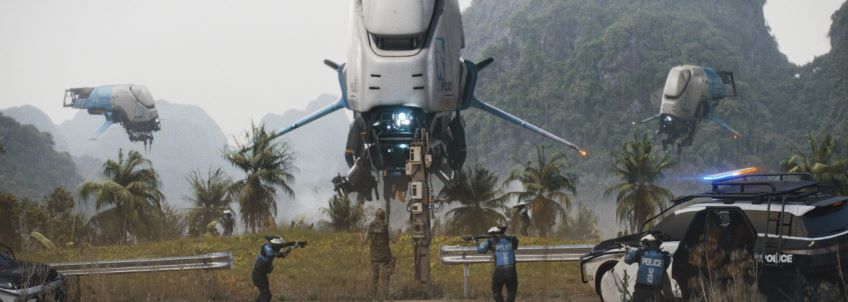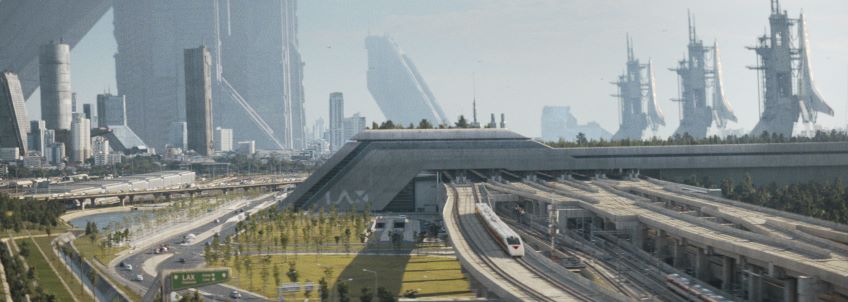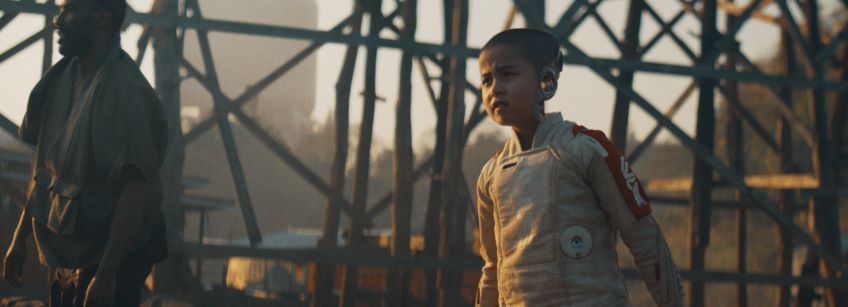Joyce Glasser reviews The Creator (September 28, 2023) Cert 12A, 133 mins
Sci-fi and special effects director Gareth Edwards (Godzilla, Rogue One: A Star Wars Story) is like a British Guillermo del Toro: he has the vivid imagination and the range and depth of technical skills to create cinematic worlds that do not exist. In his low budget debut film Monsters (2010), he served as writer, director, production designer and cinematographer, all while creating the special effects himself. Even in Monsters, the Sci-fi element is present. After a NASA probe crashes in Mexico, monsters start to appear, making it challenging for a photojournalist to accompany his boss’s daughter back to the US border.
The erection of a wall between Mexico and the USA in Monsters foreshadows Trump’s wall by years, but there are always signs that Edwards sides with the monsters – or the robots. This sympathy for the underdog continues into The Creator, in which the world is divided between a revengeful USA and a predominantly Asian country called New Asia, where Asians coexist happily with a large population of AI mutants.
Teaming up again with co-writer Chris Weitz from Rogue One, Edwards makes the most of a budget significantly smaller than Godzilla or Rogue One. While they manage to create an intricate Sci-fi world that is a visual tour de force, it comes with an overwrought and at times incoherent story with a dodgy premise.
Before we get into the drama, there’s some setting up to do. Captions tell us Nirmata means The Creator. One country’s god is another’s devil. This Creator is revered in a country called New Asia. In the USA, it is the creator of New Asia’s AI advanced technology that is a threat to the free world.

Via a mock television newscast we learn that the USA was run by robots – they even ran the civil service – until, ten years earlier, one set off a nuclear bomb that destroyed Los Angeles. War on AI was declared. NOMAD (North American Orbital Mobile Aerospace Defence) – a gigantic, armed space station with surveillance offices and attack capabilities – is somehow developed in record time and hovers over New Asia. A government spokesman declares: ‘For as long as they are a threat we will not stop hunting them down.’ Any comparison to George W Bush’s reaction to 9/11 is purely coincidental.
Cut to a romantic house on a secluded beach in New Asia where Black, US war veteran (with the bionic arm to prove it) Sergeant Joshua Taylor (John David Washington, BlacKkKlansman) has gone undercover so thoroughly, that, when we meet him, he’s in bed with his pregnant, flesh and blood Asian wife, Maya (Gemma Chan). She is believed to be the daughter of the USA’s arch enemy Nirmata. Just why he would go this far is not explained, but when the US launch a surprise attack on the Taylors’ house, ruining Taylor’s cover, he is accused of having gone native. Maya tries to escape but is killed in a NOMAD bomb blast. Joshua loses a leg trying to save her. He is now, quite literally, a broken man.
Five years go by and Joshua is approached by US Army, General Andrews (Ralpha Ineson) and Colonel Howell (Allison Janney) who want to recruit him on a mission to destroy a new AI weapon designed by Nirmata. He’s the only one alive who knows the layout of New Asia. Joshua initially tells them where to go, but when they reveal that Maya is still alive, the chance to see her again proves irresistible.
Once in New Asia, Taylor begins his search for the new AI weapon but really, he is searching for Maya. He eventually discovers the weapon in the form of a calm, docile, adorable robotic girl (Madeleine Yuna Voyles) in Dalai Lama attire.
Joshua soon discovers that this little girl has the ability to remotely control technology. Behind her human face are robotics. The back of her skull is curved to accommodate a large, round silver metal portal. Joshua is drawn to the simulant girl, nicknaming her Alphie and you don’t have to be a genius to figure out why.
Here the film turns into Mercury Rising, the 1998 Bruce Willis film in which a demoted FBI agent finds himself protecting a nine-year-old autistic savant from CIA backed assassins after the boy cracked an “uncrackable” National Security Agency code. Colonel Howell and her men believe Joshua is a traitor and go after him, now with Alphie. But since Alphie is more powerful and important to New Asia than Joshua realises, Howell is not the only one after her.

Harun (the wonderful Ken Watanabe), a simulant soldier, tells Joshua two things. The first is that Alphie will grow into her powers – she can already disable aircraft but is capable of much more. The second is that the Los Angeles nuclear bombing was not sabotage but a US military coding error, and AI was the convenient scapegoat.
In the remainder of the movie, Joshua attempts to save Alphie from his US Army pursuers while finding Maya. War breaks out, with NOMAD attacking the good people of New Asia by crushing their port city in a gigantic tank from which self-detonating robots emerge, running into New Asian crowds. Joshua finds himself going native again to save Alphie, who has left him to help save her people.
If you suspect early on, which you will, that Maya is Alphie’s mother, you will still have to figure out how a flesh and blood woman can give birth to a simulant, particularly as Maya was blown up while still pregnant. The solution, dashed off in a line in the film, is as suspect as is the question of how Nirmata can be the creator of a civilisation of robots – who seem to be able to eat and drink. And as Joshua is the father of Maya’s pregnant child, why does the “child” reveal none of her father’s traits? Other questions abound, including where are the superpowers like Russia, China and India in all this? If the USA eliminates AI, the nations retaining AI will have a military and economic advantage. You might also wonder why Joshua, whose physical prowess is awesome, shows no signs of having lost an arm and a leg.
Edwards cites a long list of films that influenced The Creator, like Apocalypse Now, Blade Runner, Alien and Star Wars and you might think of others. But since The Creator turns into an unsubtle condemnation of a “white” evolved economy like the USA’s hostility to a “different” species (a metaphor for racial discrimination), the elephant in the room is surely Neill Blomkamp’s magnificent 2009 film District 9. Set during apartheid in South Africa, a spaceship full of malnourished, ill aliens is captured. The aliens are placed in an inhumane internment camp that becomes a slum, for which the aliens are blamed. You couldn’t make it up.




